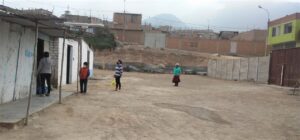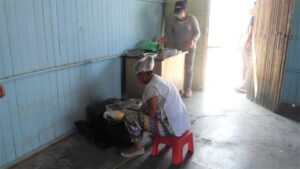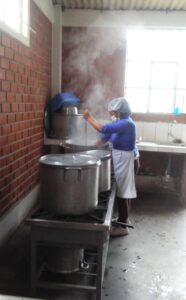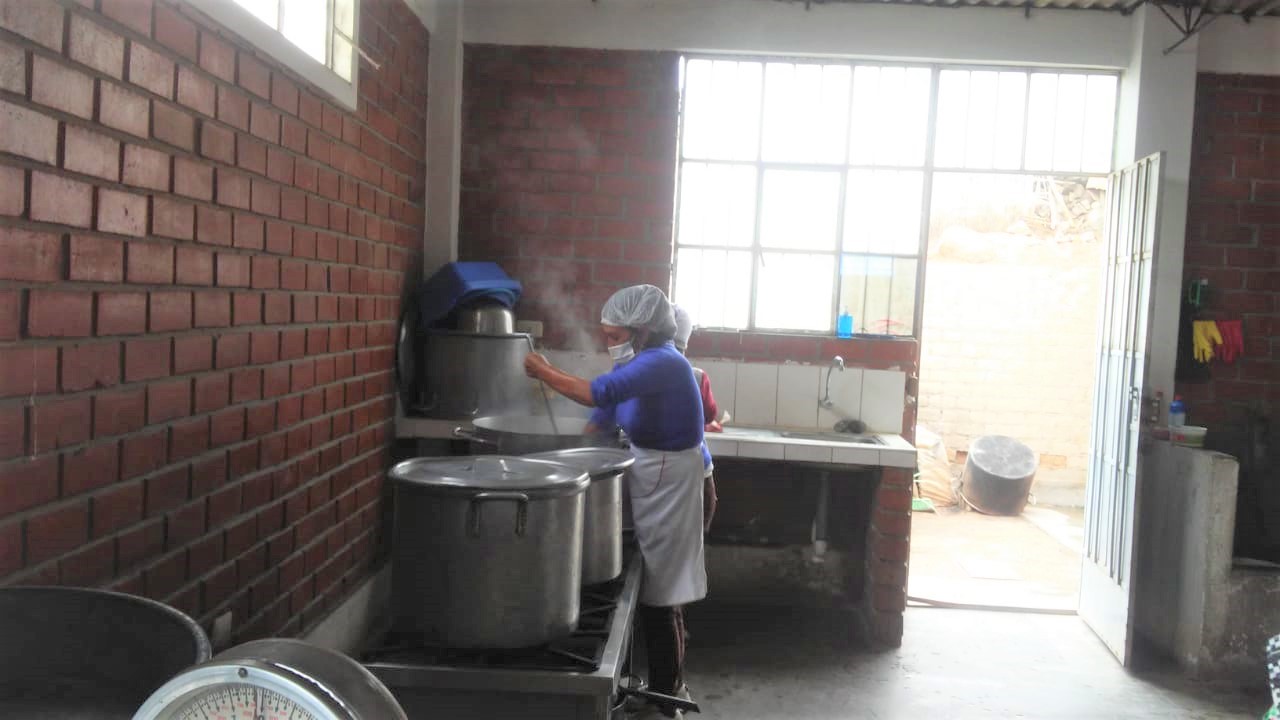Columban missionary Fr Ed O’Connell writes from Peru about the desperate plight of the people of San Benito, a township on the outskirts of the capital Lima, who have been severely affected by the Coronavirus pandemic.
Mass unemployment connected to the Covid-19 crisis has hit the community hard. The State has not been able to meet the needs of ordinary people, especially the basic needs of the urban and rural poor and the indigenous tribes in the jungle. Hospitals are unable to cope, and medical staff have been sacrificed without adequate equipment,
Warmi Huasi, a small NGO I set up with other Columbans and three professional women in 2003 to accompany families in poverty and especially children at risk. One of the places where Warmi Huasi works is in San Benito, a township on the outskirts of northern Lima in the district of Carabayllo. The Warmi Huasi team accompany and empower the community there in their efforts to resolve their problems.
Over the years, one of the main problems faced by the women in San Benito was that, whilst they worked, their children were at risk. Warmi Huasi set up, with the help of the community, four homework clubs so that the children and adolescents have a safe place in which to be, in the afternoons, as well as receive help with their homework.
Warmi Huasi also have a reading club in their Centre in San Benito on Saturday afternoons and had built a library and reading club in the local State primary and secondary school so each student has reading time in school.
 These and many more activities have been underway for the past 15 years. In San Benito the children and adolescents, the community and the Warmi Huasi team, were all looking forward to a full year of life-giving activities during 2020.
These and many more activities have been underway for the past 15 years. In San Benito the children and adolescents, the community and the Warmi Huasi team, were all looking forward to a full year of life-giving activities during 2020.
Then sadly the coronavirus arrived and all the families in San Benito and elsewhere in Peru were in lockdown from the 16th March until the 30th June. Even today, all children and adolescents under 14 and those over 65 are still in lockdown whilst the adults are allowed out to work even though Peru still ha on average 3,500 new cases each day and there is no sign as yet of the downslope.
All the Warmi Huasi teamwork from home, every weekday in virtual contact with the families, accompanying them with by listening to their family situations. We developed bio-security protocols so we could take the books from the reading clubs and distribute them to the children to read at home.
We distribute short stories and have got the children to write their own stories and have also given out leaflets on the measures to be taken to prevent the spread of covid19.
Now we are facing the prospect of mass unemployment. 70% of the working population are in the informal sector, but many jobs have been lost and others are slow at staring up again. Many of the mothers were working as street sellers, cleaners or in domestic service, none of the San Benito mothers have been able to return as of yet.
 However, in the midst of the fear of the virus and the worry of having no income to feed their families, some of the women showed their resilience. The mothers of three of the homework clubs got together, in each place, with their neighbours to start communal kitchens. By pooling their resources and giving quotas, they can feed their families and at the same time cut down on costs.
However, in the midst of the fear of the virus and the worry of having no income to feed their families, some of the women showed their resilience. The mothers of three of the homework clubs got together, in each place, with their neighbours to start communal kitchens. By pooling their resources and giving quotas, they can feed their families and at the same time cut down on costs.
The building in which the Communal Kitchen in Sector 3 of San Benito is located was built by the local community and a breakfast programme has been functioning there for years. Now they are also preparing 50 lunchtime rations that cover 18 families, with an average of five members per family, a total of 90 people being fed one meal daily. A ration is often shared between two people.
The mothers meet every afternoon to plan the next day. This communal kitchen, registered as a breakfast program for a number of years, receives some supplies of oil and food stocks form the local municipality of Carabayllo monthly.
The mothers take it in turns to prepare and cook the food, which is then collected by each family around midday and consumed at home.
Communal Kitchen in the township of Los Cipreces
Los Cipreces is a small village of 65 families in a narrow gully to one side of the main township of San Benito. They have built in wood their own community rooms, in one of which we normally have a homework club in the afternoons.
Now the children are at home. They are preparing on average 35 lunchtime rations that cover 20 families, with an average of five members per family, a total of 100 people being fed one meal daily. A ration is often shared between two people.
 Communal Kitchen of the Chapel of San Benito
Communal Kitchen of the Chapel of San Benito
In the last couple of weeks, the mothers of the Chapel homework club, that normally would meet in one of the wooden constructed huts in the mission compound, met to organise their communal kitchen, sometimes referred to as a common pot.
They are now preparing on average 48 lunchtime rations that cover 16 families, with an average of five members per family, a total of 80 people being fed one meal daily. A ration is often shared between two people. We have not as yet helped the chapel with a donation.
I think that minimally we will need to donate at least s/100 a week to each of the communal kitchens, that means s/1,200 (US$339) a month, around about £300.
I imagine that the number of rations will increase once they communal kitchens get established and better known. I am concerned that the ration be nutritive, especially for the children, so our donation will be focused on that concern.
Some of the mothers who have work will be able to pay for their rations, others will be able to make a contribution, whilst some will be social cases, including elderly people as well as children.
In time the communal kitchens will be able to sell a number of portions to third parties, who can pay a little more so that a small income can help with overheads.
When I use the royal “we”, I am talking about those who might be in a position to be in solidarity with these mothers. Parishes, Columban benefactors, friends and family have all helped me out in the past. This time it is not for the regular work with the children and adolescents, which will go on virtually one way or another, but rather a more basic and urgent appeal to help the families have a more nutritive plate of food each day.
If you would like to support Fr Ed O’Connell’s work with the community of San Benito in Peru, please send your donations to the Far East Office, Dalgan Park, Navan, Co Meath C15 AY2Y. Mark it for Fr Ed O’Connell. Alternatively, you can donate online at www.columbans.ie/donate or Tel: 00353 46 909 8275.

